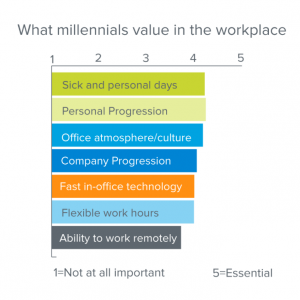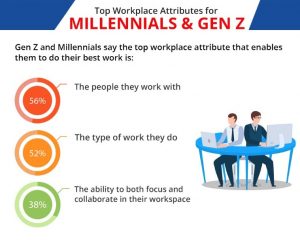
Managing Millennial
The word “millennial” is one that has taken on a new level of importance in various aspects of life today. According to the Pew Research Center, a millennial is a simple reference to people born between 1981 and 1996. Similar to the “baby boomers,” who are born between 1946 and 1964, and “Generation X,” which refers to people born between 1965 to 1980. The population who make up these three generational groups have or had a significant impact on today’s workforce.
Why is it Important to Know how to Manage Millennials?
If you are an employer or plan to be, it is important to pay serious attention to this generation. For one, they constitute today’s largest workforce. With the size of the workforce represented by baby boomers in sharp decline, millennials currently reign supreme.
According to the Pew Research Center, millennials made up 35% of the workforce in 2017 and are projected to make up 44% by 2025, and up to 75% by 2030. Currently, there is a major turnover rate among this generation group that is costing the U.S. economy a mind-boggling $30.5 billion each year. This cost breaks down to personal expenses to the respective businesses that employ them.
These statistics help explain why employers should pay close attention to this generation group, along with finding ways to adapt to them.
How Do You Best Manage a Millennial Workforce?
Now that we have acknowledged how critical this group is to the success of any business let’s look at a few specific ways employers can successfully manage this group, given their unique characteristics and tendencies.
The first task of an employer is to understand this workforce group. The different generations have different perspectives and approaches to things. For example, while a baby boomer believes in work ethics such as arriving promptly at work, putting in the required hours in the office and dressing in a manner approved by the organization for which they work. A millennial believes in the final result and not how, or during what hours it was achieved.
Understanding Millennials
Millennials do not see why they must dress in a certain way or work continually from an office during specific hours. The millennial workforce largely believes the result should justify the means. A typical millennial’s mindset goes a little like, “I should dress the way I feel comfortable, work where my mood dictates, at the time and during the hours that I will be most productive. You, the employer, should be concerned about what I deliverer.”
 This workforce also grew up in a time when most things were instantaneous. Messaging was instant – emails, chats, mobile phones. So, to them, most things should be immediate, including feedback from the employer regarding their job. Most expect a quick response from prospective employers, even during the employment process.
This workforce also grew up in a time when most things were instantaneous. Messaging was instant – emails, chats, mobile phones. So, to them, most things should be immediate, including feedback from the employer regarding their job. Most expect a quick response from prospective employers, even during the employment process.
While in school, the average millennial had many group projects. Unlike the Gen Xers, who are largely self-reliant, millennials feel comfortable working in flexible groups. While this may not apply to all, it is a common trait.
Some of the characteristics described above are considered weak spots by employers. Hence why millennials have been described as lazy, irresponsible, and having a short attention span. However, that may not be the case for all. Because the three generations have a different perspective of what ‘work ethic’ is, it is crucial for baby boomers, Gen Xers, and millennials to have a good understanding of one another to be able to create an encouraging work environment.
Getting the Best from the Millennial Workforce
With a better understanding of the characteristics of this group, an employer can get the best from them by employing the following strategies:
Offer Flexibility
Flexibility is something the millennial workforce appreciates. Including flexibility with dress codes, work times, work location, and even compensation packages. Millennials like to feel that they have some form of control over the affairs of their life.
Promote Teamwork
Teamwork allows millennials to brainstorm and synergize with others. If employers do not offer this, they may lose a large chunk of them.
 Give Specific Tasks/Goals
Give Specific Tasks/Goals
While teamwork is essential, giving specific goals allows each person to receive an acknowledgment. Personal recognition is something important to this workforce and is something every employer should consider.
Focus on Results
Rather than emphasizing the rules, focus on the results. The millennial generation does not see any reason why they must always be looked over their shoulders or demand their physical presence. Give them the space they need and focus on the results you want.
Give Constant Feedback
As you get results, give immediate feedback. Be sure to emphasize the positives and point out the areas they need to work on. Millennials look for open communication, encouragement, and help when it comes to their employer. Having an open-door policy could be a promising way to develop a connection between an employer and a millennial.
Build Relationships
You are the boss, and that is not in dispute. However, try to build a relationship with this generation. They need to know and see you care about them and their progress. It’s not just about what an employer can gain from their expertise.
Use Technology
Of course, you cannot expect to retain this millennial workforce if you do not embrace current technology. Aside from the ease, it brings to your business operations. Millennials will not be proud of working in an environment classified as “old school.” They must be proud of where they work.
Employers cannot ignore this workforce. Rather than trying to change them – try adjusting your operations to adapt to them.
Sources:
https://www.pewresearch.org/fact-tank/2018/04/11/millennials-largest-generation-us-labor-force/
https://www.wired.com/insights/2013/08/the-rise-of-the-millennial-workforce/
https://www.dimaghawi.com/dimas-blog/statistics-about-the-generations
https://dynamicsignal.com/2018/10/09/key-statistics-millennials-in-the-workplace/
https://www.forbes.com/sites/iese/2016/09/08/managing-millennials-nine-tips/#6bb531bfcd8a
https://www.thebalancecareers.com/tips-for-managing-millennials-1918678
https://www.inc.com/michael-olguin/5-tips-for-managing-millennial-employees.html

